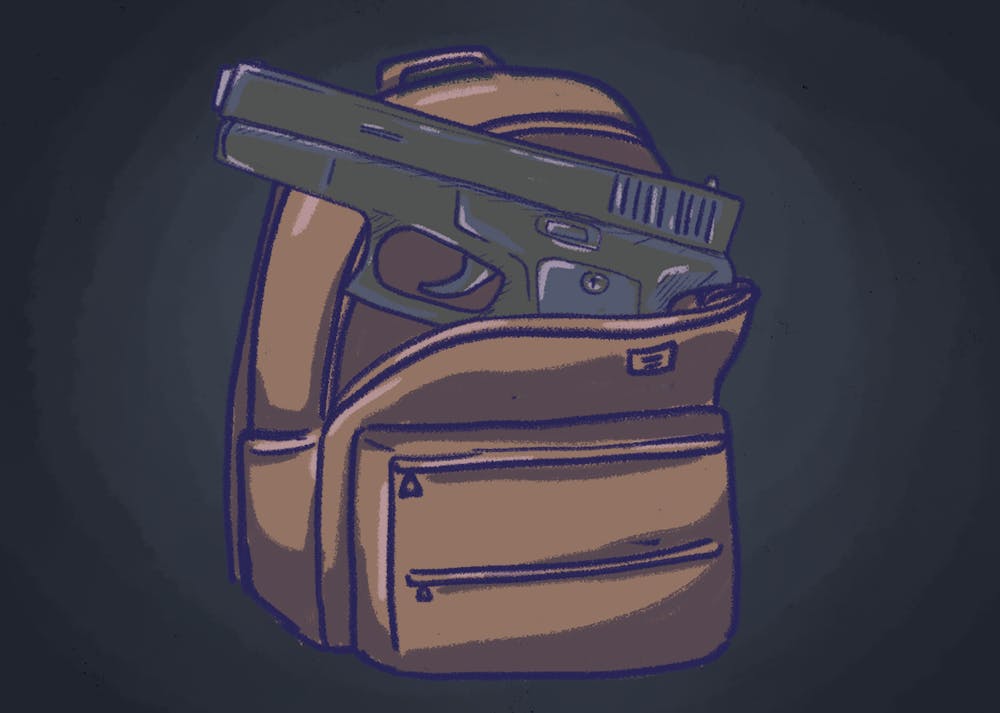A bill that allows those with concealed carry permits to have firearms on university, college and community college campuses is moving through the Arizona State Legislature.
On Jan. 20, the Arizona Senate Judiciary Committee passed Senate Bill 1123, which would prohibit universities, colleges and community colleges from enforcing policies that restrict individuals from bringing weapons to campus. The bill passed 4-3 with one not voting.
ASU policy states certified police officers are the only people allowed to carry guns on campus. Those coming to campus must store weapons inside a car or motorcycle and it cannot be visible.
Individuals who are 21 and over can apply for a concealed weapons permit if they complete a firearms safety training program and have the appropriate qualifications. This permit allows them to carry a weapon and keep it hidden from surrounding observers.
READ MORE: ASU’s gun policy: What’s allowed, what’s not and what’s next?
State Sen. Wendy Rogers, R-Flagstaff, sponsored the bill and said legalizing concealed carry on campus would make universities safer.
“I am a believer that guns save lives,” said Rogers during the senate committee meeting on Jan. 20. “If a college student has a concealed carry weapons permit, he or she should be able to carry on campus and thus make the campus safer.”
A bill that would have legalized concealed weapons carry on university and community college campuses reached the governor's desk in 2011. However, former Gov. Jan Brewer vetoed the bill because its phrasing was confusing.
ASU Young Americans for Liberty began showing its support for allowing students to carry guns on campus in a petition published last semester. "The fundamental right to self-defense should not be usurped by partisan college administrators, especially when they are not the ones who are generally affected by campus crime," the petition says.
Alyssa Kihoi, the vice president of ASU Young Americans for Liberty and a senior studying criminology and criminal justice, said she does not think university environments will change if people carry firearms with a concealed carry permit, and those who are concerned about guns on campus “need to have trust and faith in their neighbor.”
“I can't stress enough that concealed carry weapon holders are trained and have background checks,” Kihoi said. “People that own guns do not just go around mishandling (their) firearm.”
The Arizona Board of Regents, along with the university presidents, oppose the legislation, said Page Gonzales, ABOR's vice president of government affairs and community relations.
“The mission of higher education is to promote the discovery, application and dissemination of new knowledge,” Gonzales said during her testimony. “Allowing guns on our campuses would detract from that mission.”
ASU Chief of Police Michael Thompson told members of the Senate Judiciary Committee he has seen university students “make very poor decisions on a daily basis." Drawing from this context, he said guns on campus could lead to violent consequences, especially since the bill does not exclude concealed weapons in dorms.
“Adding guns to an already high-risk environment of alcohol, drugs, overreaction, lack of experience and immaturity is a very dangerous combination,” said Thompson during his testimony.
March for Our Lives ASU released a press release Thursday expressing its opposition to the bill and how "research has shown that the presence of more guns does not lead to a safer university experience." Members of the organization are in the process of calling state representatives asking them to oppose the bill.
Jacob Sumner, the president of March For Our Lives ASU, said he was concerned how the presence of guns could elevate conflict on campus.
“I could see situations where groups are holding protests on campus and they're confronted by people with firearms,” said Sumner, a senior studying public administration, computer science and political science. “I'm worried about fights escalating on campus, arguments escalating, things like that.”
Kihoi said she believes the way a person exercises their constitutional rights should not be limited because of the environment they are in.
“I think that your right should follow you anywhere within this country and within the state of Arizona,” Kihoi said.
Reach the reporter at awaiss@asu.edu and @WaissAlexis on Twitter.
Like The State Press on Facebook and follow @statepress on Twitter.

Alexis Waiss is an assignment editor and senior reporter, covering breaking news and writing long-form stories. Alexis worked on SP's politics desk for a year, where she reported on the Legislature, higher education policy, student government, the city of Tempe and stories highlighting social justice. She previously worked as a fellow for the Asian American Journalist Association's VOICES program.




